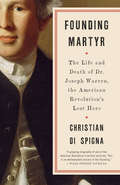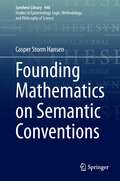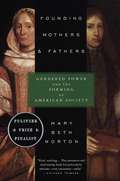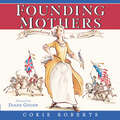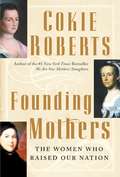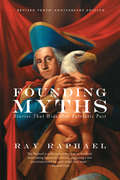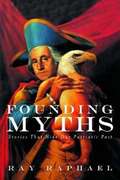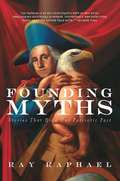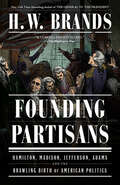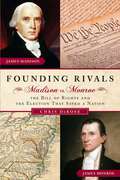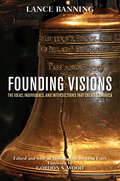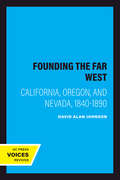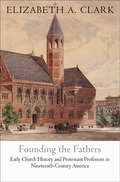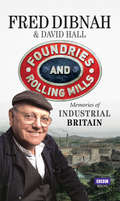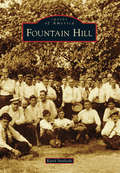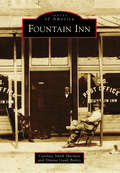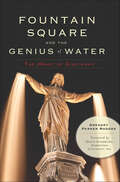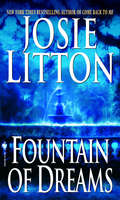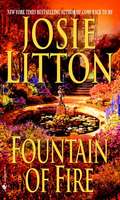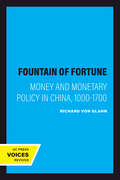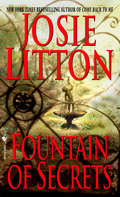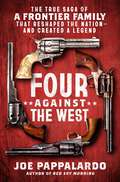- Table View
- List View
Founding Martyr: The Life and Death of Dr. Joseph Warren, the American Revolution's Lost Hero
by Christian Di SpignaA rich and illuminating biography of America’s forgotten Founding Father, the patriot physician and major general who fomented rebellion and died heroically at the battle of Bunker Hill on the brink of revolutionLittle has been known of one of the most important figures in early American history, Dr. Joseph Warren, an architect of the colonial rebellion, and a man who might have led the country as Washington or Jefferson did had he not been martyred at Bunker Hill in 1775. Warren was involved in almost every major insurrectionary act in the Boston area for a decade, from the Stamp Act protests to the Boston Massacre to the Boston Tea Party, and his incendiary writings included the famous Suffolk Resolves, which helped unite the colonies against Britain and inspired the Declaration of Independence. Yet after his death, his life and legend faded, leaving his contemporaries to rise to fame in his place and obscuring his essential role in bringing America to independence.Christian Di Spigna’s definitive new biography of Warren is a loving work of historical excavation, the product of two decades of research and scores of newly unearthed primary-source documents that have given us this forgotten Founding Father anew. Following Warren from his farming childhood and years at Harvard through his professional success and political radicalization to his role in sparking the rebellion, Di Spigna’s thoughtful, judicious retelling not only restores Warren to his rightful place in the pantheon of Revolutionary greats, it deepens our understanding of the nation’s dramatic beginnings.
Founding Mathematics on Semantic Conventions (Synthese Library #446)
by Casper Storm HansenThis book presents a new nominalistic philosophy of mathematics: semantic conventionalism. Its central thesis is that mathematics should be founded on the human ability to create language – and specifically, the ability to institute conventions for the truth conditions of sentences.This philosophical stance leads to an alternative way of practicing mathematics: instead of “building” objects out of sets, a mathematician should introduce new syntactical sentence types, together with their truth conditions, as he or she develops a theory.Semantic conventionalism is justified first through criticism of Cantorian set theory, intuitionism, logicism, and predicativism; then on its own terms; and finally, exemplified by a detailed reconstruction of arithmetic and real analysis.Also included is a simple solution to the liar paradox and the other paradoxes that have traditionally been recognized as semantic. And since it is argued that mathematics is semantics, this solution also applies to Russell’s paradox and the other mathematical paradoxes of self-reference.In addition to philosophers who care about the metaphysics and epistemology of mathematics or the paradoxes of self-reference, this book should appeal to mathematicians interested in alternative approaches.
Founding Mothers & Fathers: Gendered Power and the Forming of American Society
by Mary Beth NortonMuch like A Midwife's Tale and The Unredeemed Captive, this novel is about power relationships in early American society, religion, and politics--with insights into the initial development and operation of government, the maintenance of social order, and the experiences of individual men and women.From the Hardcover edition.
Founding Mothers: Remembering the Ladies
by Cokie Roberts#1 New York Times bestselling author and celebrated journalist Cokie Roberts brings young readers a stunning nonfiction picture book that highlights the female patriots of the American Revolution. This nonfiction picture book is an excellent choice to share during homeschooling, in particular for children ages 4 to 6. It’s a fun way to learn to read and as a supplement for activity books for children.Beautifully illustrated by Caldecott Honor–winning artist Diane Goode, Founding Mothers: Remembering the Ladies reveals the incredible accomplishments of the women who orchestrated the American Revolution behind the scenes.Roberts traces the stories of heroic, patriotic women such as Abigail Adams, Martha Washington, Phillis Wheatley, Mercy Otis Warren, Sarah Livingston Jay, and others. Details are gleaned from their letters, private journals, lists, and ledgers. The bravery of these women’s courageous acts contributed to the founding of America and spurred the founding fathers to make this a country that “remembered the ladies.”This compelling book, based on the author's acclaimed work for adults, Founding Mothers, includes a rich time line, biographies, an author’s note, and additional web resources in the back matter. Parents and educators looking for a more in-depth book beyond the Rosie Revere and Rad Women series will welcome Founding Mothers.
Founding Mothers: The Women Who Raised Our Nation
by Cokie RobertsCokie Roberts's number one New York Times bestseller, We Are Our Mothers' Daughters, examined the nature of women's roles throughout history and led USA Today to praise her as a "custodian of time-honored values." Her second bestseller, From This Day Forward, written with her husband, Steve Roberts, described American marriages throughout history, including the romance of John and Abigail Adams. Now Roberts returns with Founding Mothers, an intimate and illuminating look at the fervently patriotic and passionate women whose tireless pursuits on behalf of their families -- and their country -- proved just as crucial to the forging of a new nation as the rebellion that established it.While much has been written about the men who signed the Declaration of Independence, battled the British, and framed the Constitution, the wives, mothers, sisters, and daughters they left behind have been little noticed by history. Roberts brings us the women who fought the Revolution as valiantly as the men, often defending their very doorsteps. While the men went off to war or to Congress, the women managed their businesses, raised their children, provided them with political advice, and made it possible for the men to do what they did. The behind-the-scenes influence of these women -- and their sometimes very public activities -- was intelligent and pervasive.Drawing upon personal correspondence, private journals, and even favored recipes, Roberts reveals the often surprising stories of these fascinating women, bringing to life the everyday trials and extraordinary triumphs of individuals like Abigail Adams, Mercy Otis Warren, Deborah Read Franklin, Eliza Pinckney, Catherine Littlefield Green, Esther DeBerdt Reed, and Martha Washington -- proving that without our exemplary women, the new country might never have survived.Social history at its best, Founding Mothers unveils the drive, determination, creative insight, and passion of the other patriots, the women who raised our nation. Roberts proves beyond a doubt that like every generation of American women that has followed, the founding mothers used the unique gifts of their gender -- courage, pluck, sadness, joy, energy, grace, sensitivity, and humor -- to do what women do best, put one foot in front of the other in remarkable circumstances and carry on.
Founding Myths
by Ray RaphaelFirst published ten years ago, award-winning historian Ray Raphael's Founding Myths has since established itself as a landmark of historical myth-busting. With the author's trademark wit and flair, Founding Myths exposes the errors and inventions in America's most cherished tales, from Paul Revere's famous ride to Patrick Henry's "Liberty or Death" speech. For the seventy thousand readers who have been captivated by Raphael's eye-opening accounts, history has never been the same.In this revised tenth-anniversary edition, Raphael revisits the original myths and explores their further evolution over the past decade, uncovering new stories and peeling back additional layers of misinformation. This new edition also examines the highly politicized debates over America's past, as well as how school textbooks and popular histories often reinforce rather than correct historical mistakes.A book that "explores the truth behind the stories of the making of our nation" (National Public Radio), this revised edition of Founding Myths will be a welcome resource for anyone seeking to separate historical fact from fiction.
Founding Myths: Stories That Hide Our Patriotic Past
by Ray RaphaelRaphael questions the validity of the legend of Paul Revere's ride, Thomas Jefferson's status as the architect of American equality, and the existence of Molly Pitcher.
Founding Myths: Stories That Hide Our Patriotic Past
by Ray RaphaelWith wit and flair, Founding Myths exposes the errors and inventions in thirteen of America's most cherished tales, from Paul Revere's famous ride to Patrick Henry's "Liberty or Death" speech. Exploring the dynamic intersection between history-making and story-making, award-winning author and historian Ray Raphael shows how these fictions--conceived in the narrowly nationalistic politics of the nineteenth century--undermine our democratic ideals.
Founding Partisans: Hamilton, Madison, Jefferson, Adams and the Brawling Birth of American Politics
by H. W. BrandsFrom bestselling historian and Pulitzer Prize finalist H.W. Brands, a revelatory history of the shocking emergence of vicious political division at the birth of the United States.To the framers of the Constitution, political parties were a fatal threat to republican virtues. They had suffered the consequences of partisan politics in Britain before the American Revolution, and they wanted nothing similar for America. Yet parties emerged even before the Constitution was ratified, and they took firmer root in the following decade. In Founding Partisans, master historian H. W. Brands has crafted a fresh and lively narrative of the early years of the republic as the Founding Fathers fought one another with competing visions of what our nation would be.The first party, the Federalists, formed around Alexander Hamilton, James Madison and their efforts to overthrow the Articles of Confederation and make the federal government more robust. Their opponents organized as the Antifederalists, who feared the corruption and encroachments on liberty that a strong central government would surely bring. The Antifederalists lost but regrouped under the new Constitution as the Republicans, led by Thomas Jefferson, whose bruising contest against Federalist John Adams marked the climax of this turbulent chapter of American political history. The country&’s first years unfolded in a contentious spiral of ugly elections and blatant violations of the Constitution. Still, peaceful transfers of power continued, and the nascent country made its way towards global dominance, against all odds. Founding Partisans is a powerful reminder that fierce partisanship is a problem as old as the republic.
Founding Rivals: Madison vs. Monroe, The Bill of Rights, and The Election that Saved a Nation
by Chris DeroseThe Amazing True Story of the Election That Saved the ConstitutionIn 1789, James Madison and James Monroe ran against each other for Congress--the only time that two future presidents have contested a congressional seat.But what was at stake, as author Chris DeRose reveals in Founding Rivals: Madison vs. Monroe, the Bill of Rights, and the Election That Saved a Nation, was more than personal ambition. <P><P>This was a race that determined the future of the Constitution, the Bill of Rights, the very definition of the United States of America.Friends and political allies for most of their lives, Madison was the Constitution's principal author, Monroe one of its leading opponents. Monroe thought the Constitution gave the federal government too much power and failed to guarantee fundamental rights. Madison believed that without the Constitution, the United States would not survive.It was the most important congressional race in American history, more important than all but a few presidential elections, and yet it is one that historians have virtually ignored. <P><P>In Founding Rivals, DeRose, himself a political strategist who has fought campaigns in Madison and Monroe's district, relives the campaign, retraces the candidates' footsteps, and offers the first insightful, comprehensive history of this high-stakes political battle. <P><P>DeRose reveals: <br>How Madison's election ensured the passage of a Bill of Rights--and how Monroe's election would have ensured its failure <br>How Madison came from behind to win a narrow victory (by a margin of only 336 votes) in a district gerrymandered against him <br>How the Bill of Rights emerged as a campaign promise to Virginia's evangelical Christians <br>Why Madison's defeat might have led to a new Constitutional Convention--and the breakup of the United States <br>Founding Rivals tells the extraordinary, neglected story of two of America's most important Founding Fathers. Brought to life by unparalleled research, it is one of the most provocative books of American political history you will read this year.
Founding St. Louis: First City of the New West
by J. Frederick FauszThe animal wealth of the western "wilderness" provided by talented "savages" encouraged French-Americans from Illinois, Canada and Louisiana to found a cosmopolitan center of international commerce that was a model of multicultural harmony. Historian J. Frederick Fausz offers a fresh interpretation of Saint Louis from 1764 to 1804, explaining how Pierre Lacl de, the early Chouteaus, Saint Ange de Bellerive and the Osage Indians established a "gateway" to an enlightened, alternative frontier of peace and prosperity before Lewis and Clark were even born. Historians, genealogists and general readers will appreciate the well-researched perspectives in this engaging story about a novel French West long ignored in American History.
Founding Visions: The Ideas, Individuals, and Intersections that Created America
by Lance Banning“Banning’s skill as an essayist shines” in this collection of writing on the foundation of the American republic (San Francisco Book Review).Lance Banning was assembling this collection of his best and most representative writings on the Founding era when his untimely death stalled the project just short of its completion. Now, thanks to the efforts of editor Todd Estes, this illuminating resource is finally available. Founding Visions showcases the work of a historian who shaped the intellectual debates of his time. Featuring a foreword by Gordon S. Wood, the volume presents Banning’s most seminal and insightful essays to a new generation of students, scholars, and general readers.“Lance Banning’s balanced but penetrating view of historical materials makes him a vital mediator in scholarly disputes, one who knows how to bring light rather than heat to controversies better understood as joint contributions. . . . Every historian, whether beginning or advanced, will benefit from reading this book.” —Robert A. Ferguson, Columbia University, author of Reading the Early Republic“Banning’s impeccable scholarship has shaped the way we think about early American history, and the essays in this volume show him at the peak of his very considerable powers.” —Peter S. Onuf, Robert H. Smith International Center for Jefferson Studies, author of The Origins of the Federal Republic: Jurisdictional Controversies in the United States, 1775-1787“Exemplary.” —Journal of Southern History“The work represents an impressive collection that is an essential companion to any serious student of the intellectual issues of the early Republic.” —Southern Historian
Founding Weimar
by Mark JonesThe German Revolution of 1918–1919 was a transformative moment in modern European history. It was both the end of the German Empire and the First World War, as well as the birth of the Weimar Republic, the short-lived democracy that preceded the establishment of the Nazi dictatorship. A time of great political drama, the Revolution saw unprecedented levels of mass mobilisation and political violence, including the 'Spartacist Uprising' of January 1919, the murders of Karl Liebknecht and Rosa Luxemburg, and the violent suppression of strikes and the Munich Councils' Republic. Drawing upon the historiography of the French Revolution, Founding Weimar is the first study to place crowds and the politics of the streets at the heart of the Revolution's history. Carefully argued and meticulously researched, it will appeal to anyone with an interest in the relationship between violence, revolution, and state formation, as well as in the history of modern Germany.
Founding a Balkan State
by Robert Clegg AustinFounding a Balkan State examines the pivotal period in Albanian history when the country's fundamental goals and directions were most hotly contested. In 1920, liberal Albanian leaders - led by the US-educated Bishop Fan S. Noli - began working to introduce democracy to the country, hoping that it would lead to modernization, prosperity, and overturning the legacy of five hundred years of Ottoman rule. In 1924, these leaders mounted a successful revolution; by 1925, however, their forces were in retreat. Albania soon slid into dictatorship under Ahmed Bey Zogu - first as president, then as self-proclaimed king.Founding a Balkan State provides the only comprehensive assessment in English of these events. Robert C. Austin first delves into the country's weak domestic and international position both before and after the First World War, then assesses the internal and external challenges posed to its state- and nation-building efforts. Austin shrewdly demonstrates how the missed opportunities of Albania's political transition affected the course of Balkan history for decades to come.
Founding the Far West: California, Oregon, and Nevada, 1840-1890
by David Alan JohnsonFounding the Far West is an ambitious and vividly written narrative of the early years of statehood and statesmanship in three pivotal western territories. Johnson offers a model example of a new approach to history that is transforming our ideas of how America moved west, one that breaks the mold of "regional" and "frontier" histories to show why Western history is also American history.Johnson explores the conquest, immigration, and settlement of the first three states of the western region. He also investigates the building of local political customs, habits, and institutions, as well as the socioeconomic development of the region. While momentous changes marked the Far West in the later nineteenth century, distinctive local political cultures persisted. These were a legacy of the pre-Civil War conquest and settlement of the regions but no less a reflection of the struggles for political definition that took place during constitutional conventions in each of the three states.At the center of the book are the men who wrote the original constitutions of these states and shaped distinctive political cultures out of the common materials of antebellum American culture. Founding the Far West maintains a focus on the individual experience of the constitution writers—on their motives and ambitions as pioneers, their ideological intentions as authors of constitutions, and the successes and failures, after statehood, of their attempts to give meaning to the constitutions they had produced.
Founding the Fathers: Early Church History and Protestant Professors in Nineteenth-Century America (Divinations: Rereading Late Ancient Religion)
by Elizabeth A. ClarkThrough their teaching of early Christian history and theology, Elizabeth A. Clark contends, Princeton Theological Seminary, Harvard Divinity School, Yale Divinity School, and Union Theological Seminary functioned as America's closest equivalents to graduate schools in the humanities during the nineteenth century. These four Protestant institutions, founded to train clergy, later became the cradles for the nonsectarian study of religion at secular colleges and universities. Clark, one of the world's most eminent scholars of early Christianity, explores this development in Founding the Fathers: Early Church History and Protestant Professors in Nineteenth-Century America.Based on voluminous archival materials, the book charts how American theologians traveled to Europe to study in Germany and confronted intellectual currents that were invigorating but potentially threatening to their faith. The Union and Yale professors in particular struggled to tame German biblical and philosophical criticism to fit American evangelical convictions. German models that encouraged a positive view of early and medieval Christianity collided with Protestant assumptions that the church had declined grievously between the Apostolic and Reformation eras. Trying to reconcile these views, the Americans came to offer some counterbalance to traditional Protestant hostility both to contemporary Roman Catholicism and to those historical periods that had been perceived as Catholic, especially the patristic era.
Foundries and Rolling Mills: Memories of Industrial Britain
by David Hall Fred DibnahJoin engineer, steeplejack and beloved storyteller Fred Dibnah, as he takes you on a personal tour through industrial Britain.Bringing to life landmark events from the eighteenth to the early twentieth century in his typically engaging and anecdotal style, Fred introduces the great inventors from the age of steam, describes the day-to-day operation of railways, mills, forges and factories, and paints a vivid picture of what life was like for the mill-hands, colliers and engineers who laboured in industrial Britain - the workshop of the world.With a comprehensive gazetteer, which lists details of over 230 places of industrial interest - from steam railways and ships, to windmills and watermills - Foundries and Rolling Mills is a glorious portrait of Britain at the height of its industrial power, from one of our most revered figures.
Fountain Hill
by Karol StreleckiIncorporated in 1893, Fountain Hill has developed a reputation as a quiet residential enclave located in a lush, wooded valley whose springs and creeks drain into the Lehigh River at Bethlehem. Its history is closely tied to the Fountain Hill Historic District of South Bethlehem. At the same time, the borough has developed a spirit and presence of its own. Home to St. Luke's University Hospital--the first hospital in the Lehigh Valley and now a leading medical treatment facility in eastern Pennsylvania--the borough also boasts a variety of historic homes and developments. While Fountain Hill has remained primarily residential since its inception, its history has been an assemblage of creative enterprises and curious personalities that have left an imprint on the town. For a time, it hosted a thriving silk and garment industry, but this was short-lived, and the hulks of these buildings remain as reminders of a dream unfulfilled.
Fountain Inn (Images of America)
by Caroline Smith Sherman Dianne Gault BaileyBefore there was an inn and a fountain, the present town of Fountain Inn was half Indian Territory bisected by the “Old Indian Boundary Line.” It was established in 1766 by a treaty made between Old Hop, the head of the Cherokees, and Gov. James Glen of the province of South Carolina. The Cherokees used this area—a region of dense forests, canebrakes, and springs of water—for hunting deer, turkeys, panthers, bears, wolves, wildcats, and even buffalo. Only a few settlers had moved to the territory prior to the Revolutionary War. The Fairview Presbyterian Church community was not settled until 1786. Around 1830, a stagecoach stop was established where there was not only an inn but also a spring of water that gushed two feet in the air like a fountain. In time, the stop became known as Fountain Inn. After the War Between the States, Noah Cannon, a resident of the Greer area, bought up huge tracts of land, and so began the village that was chartered in 1886.
Fountain Square and the Genius of Water: The Heart of Cincinnati (Landmarks)
by Gregory Parker RogersIn 1871, Henry Probasco donated the Tyler Davidson Fountain to the people of the city of Cincinnati in honor of his brother-in-law. Probasco wanted to leave a practical and artistic gift to the city and its residents that had made both men fabulously wealthy. Though it was placed on Fifth Street, away from the central business district, the fountain became a centerpiece of the city around its boom years, and downtown Cincinnati grew up around the statue. Author Greg Rogers chronicles the history of the fountain and its influence on the landscape and culture of the city.
Fountain of Dreams (Akora)
by Josie LittonNew York Times bestselling author Josie Litton captivated readers with tales of the passionate--sometimes forbidden--unions between the fiery men and women of the island nation of Akora and those of mighty England. Now the next generation of lovers longs to follow suit--but new conflicts may prevent history from repeating itself.... Fountain of DreamsLovely, loyal, and strong-willed as her parents before her, Amelia Darcourt is nonetheless entirely unprepared for her reaction to her family’s compelling American visitor. The handsome young man is a match not only for her wits but for her heart. Yet no sooner does Amelia discover the attraction is mutual than she learns of a secret that may destroy her happiness. Could the man she is so drawn to have an ulterior motive for returning her affections--one involving the beloved island whose blood courses through her veins?Charged with a secret mission to investigate the disappearance of several American seamen believed imprisoned on Akora, Niels has come to England seeking Lord Alex Darcourt’s help in entering the fortress kingdom. But in spirited Amelia Darcourt he has found so much more. Their burgeoning passion has him caught between duty and desire. Loath to leave her side, Niels resolves to win her heart upon his return. But just as the two are destined to be together, they are destined to face the challenges that threaten to keep them apart. Only then will they be free to seal their love.
Fountain of Fire (Akora)
by Josie LittonThe legendary island nation of Akora endows its descendants with rare gifts. Now one compassionate young woman must discover her own extraordinary power--and her heart’s desire--by facing the greatest challenge of her life....Fountain of FireDaughter of a renowned Akoran warrior and an English-born beauty, Clio is content with her lot as a pretty, warmhearted girl among a family of compelling and exquisitely attractive people. Yet it is precisely her immensely soothing nature that is to bring her unexpected power--and passion. For a distressed young Queen Victoria has requested that Clio become her lady-in-waiting. During a time of political unrest, it is a position of inherent danger. But Clio is determined to be of service....Charged with safeguarding the queen from a suspected assassination plot, William, earl of Holyhood, is delighted to have the company of Clio. Not only is her sweetness a balm to the soul, but she is also, curiously, an Akoran princess. Long fascinated by the tantalizing island, William soon finds his interest superseded by an enchantment with Clio herself. Surprised by their deep mutual attraction, the couple have only to agree on how best to protect the queen--and themselves--from those who would steal their futures. But it is a task more easily said than done, and one that may hold the fate of an empire--and a blossoming love--in the balance.
Fountain of Fortune: Money and Monetary Policy in China, 1000-1700
by Richard von GlahnThe most striking feature of Wutong, the preeminent God of Wealth in late imperial China, was the deity’s diabolical character. Wutong was perceived not as a heroic figure or paragon but rather as an embodiment of greed and lust, a maleficent demon who preyed on the weak and vulnerable. In The Sinister Way, Richard von Glahn examines the emergence and evolution of the Wutong cult within the larger framework of the historical development of Chinese popular or vernacular religion—as opposed to institutional religions such as Buddhism or Daoism. Von Glahn’s study, spanning three millennia, gives due recognition to the morally ambivalent and demonic aspects of divine power within the common Chinese religious culture.Surveying Chinese religion from 1000 BCE to the beginning of the twentieth century, The Sinister Way views the Wutong cult as by no means an aberration. In Von Glahn’s work we see how, from earliest times, the Chinese imagined an enchanted world populated by fiendish fairies and goblins, ancient stones and trees that spring suddenly to life, ghosts of the unshriven dead, and the blood-eating spirits of the mountains and forests. From earliest times, too, we find in Chinese religious culture an abiding tension between two fundamental orientations: on one hand, belief in the power of sacrifice and exorcism to win blessings and avert calamity through direct appeal to a multitude of gods; on the other, faith in an all-encompassing moral equilibrium inhering in the cosmos.
Fountain of Secrets (Akora)
by Josie LittonIn a captivating tale that returns readers to the enchanting island nation of Akora, a remarkable young man and woman, torn between love for each other and duty to their homelands, discover that fate has not forgotten them.Fountain of SecretsHonorable, loyal, and deeply devoted to his family, Gavin, the eldest son of the earl of Hawkforte, is also a young man with a troubling secret. Disillusioned by the colonialist course his country is pursuing, Gavin has no wish to succeed his father. Rather, his heart is drawn toward the other half of his heritage--the wondrous kingdom of Akora and the life he senses awaits him there. His future will in fact be more astonishing than even he can imagine, but before it can begin, he must resolve his conflict--and his feelings for the woman he loves.Strikingly beautiful, intelligent, and dedicated to her homeland, Elena knows her fate is to be the wife and helpmate of the next ruler of Akora. Tragically, it is a destiny she believes must keep her apart from Gavin, the English nobleman who commands her heart. But together the couple will soon discover that the future cannot always be predicted--especially one that holds more hidden surprises, dangers, and rich rewards than either of them could have dreamed.
Four Against the West: The True Saga of a Frontier Family That Reshaped the Nation—and Created a Legend
by Joe PappalardoA thrilling true saga of legendary Texas figure Judge Roy Bean and his brothers―and their violent adventures in Wild West America.Roy Bean was an American saloon-keeper and Justice of the Peace in Texas, who called himself "The Only Law West of the Pecos". He and his three brothers set out from Kentucky in the mid 1840s, heading into the American frontier to find their fortunes. Their lifetimes of triumphs, tragedies, laurels and scandals will play out on the battlefields of Mexico, in shady dealings in California city halls, inside eccentric saloon courtrooms of Texas, and along the blood-soaked Santa Fe Trail from Missouri to New Mexico. They will kill men, and murder will likewise stalk them.The Beans chase their American dreams as the nation reinvents itself as a coast-to-coast powerhouse, only to be tested by the Civil War. During their saga, the brothers become soldiers, judges, husbands, guerillas, lawmen, entrepreneurs, refugees, fathers, politicians, pioneers and – in Judge Roy Bean’s case – one of the Old West’s best known but least understood scoundrels.Using new information gleaned from exhaustive research, Joe Pappalardo's Four Against the West is an unprecedented and vivid telling of the intertwined stories of all four Bean brothers, exploring for the first time how their relentless ambitions helped create a new America.
